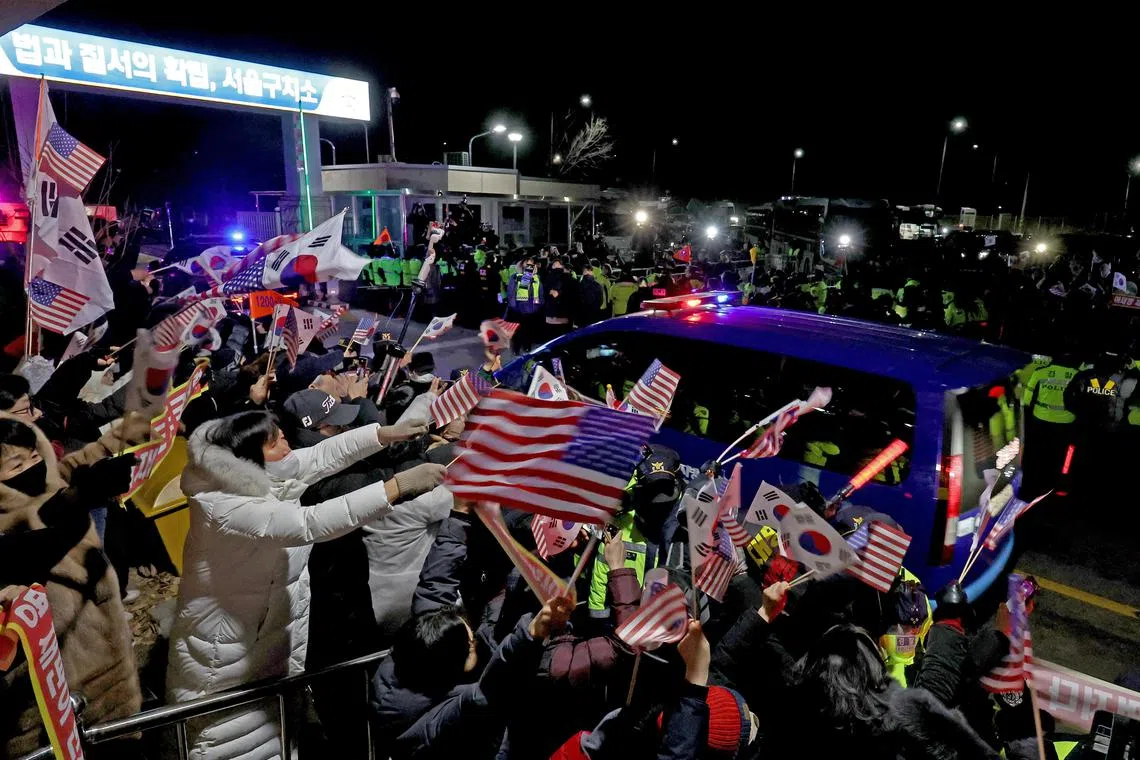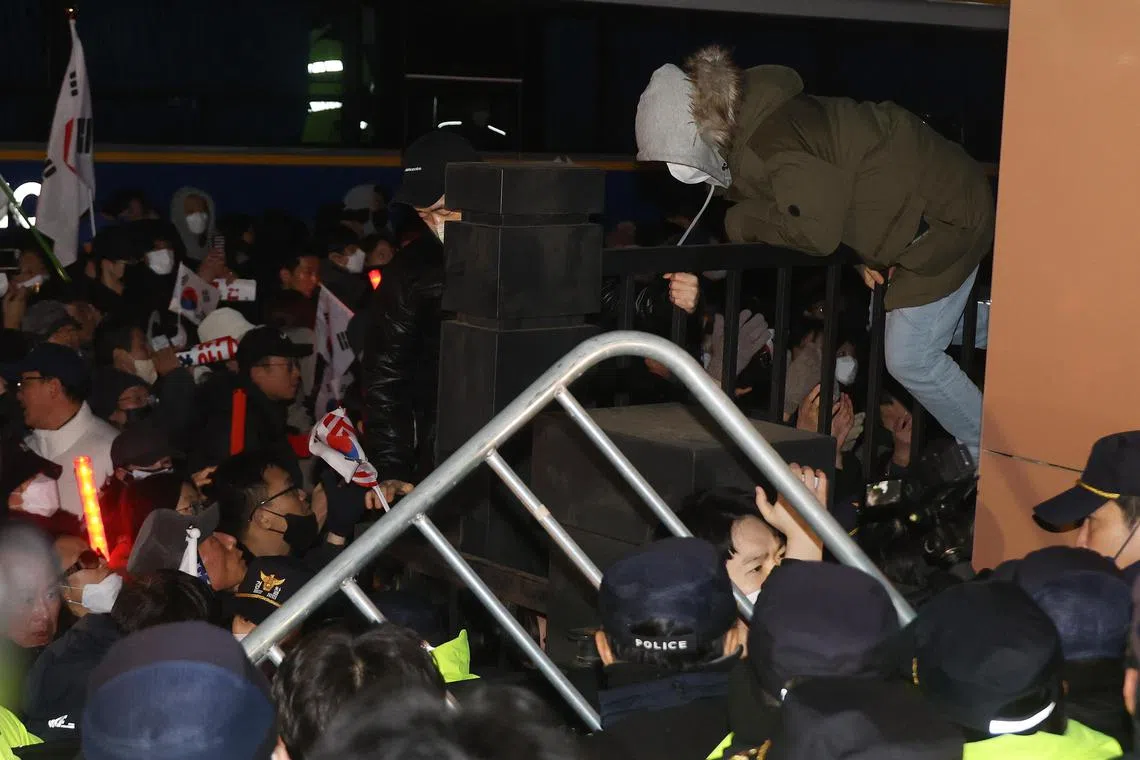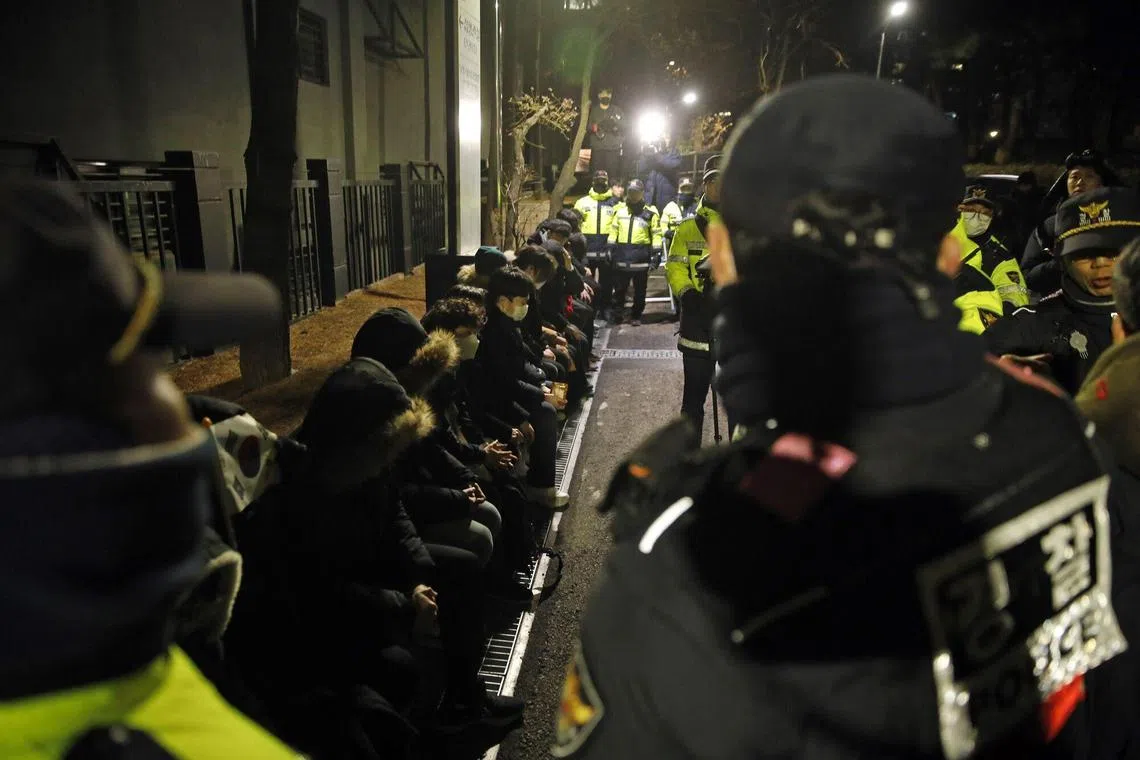South Korean court extends Yoon Suk Yeol’s detention, angering supporters
Sign up now: Get insights on Asia's fast-moving developments

Supporters of impeached South Korean President Yoon Suk Yeol cheering for him as a convoy believed to be carrying him headed to the Seoul Detention Centre after his court hearing on Jan 18.
PHOTO: EPA-EFE
SEOUL – Hundreds of supporters of South Korea’s arrested President Yoon Suk Yeol stormed a court building early on Jan 19 after his detention was extended.
They smashed windows and broke down doors to enter the court after the decision was announced, chanting his name. He plunged South Korea into its worst political chaos in decades with his bid to suspend civilian rule.
AFP reporters saw hundreds of police entering the building. They restored order a few hours later, saying they arrested 46 protesters.
“We will track down till the end more of those who committed illegal acts or instigated and assisted,” the Seoul Metropolitan Police said.
South Korea’s acting police chief said protesters storming a court and damaging its property pose a grave challenge to the rule of law.
Mr Lee Ho-young added that the police would also investigate threats against a judge who issued the warrant to extend the detention.
There were around 40 minor injuries sustained during the chaos but no serious injuries were reported, an emergency responder near the court said.
Nine police officers were injured, Yonhap news agency reported.
Acting President Choi Sang-mok said: “The government expresses strong regret over the illegal violence... which is unimaginable in a democratic society.”
The Dec 3 martial law declaration
He was detained in a dawn raid
The Seoul Western District Court said on Jan 18 that it issued a formal arrest warrant extending his detention as “there is a concern that the suspect may destroy evidence”.
South Korean regulations require a suspect detained under a warrant to undergo a physical exam, have a mugshot taken and wear a prison uniform.
Mr Yoon is being held in a solitary cell at the Seoul Detention Centre.
His conservative People Power Party (PPP) called the court’s decision a “great pity”.
“There’s a question whether repercussions of detaining a sitting president were sufficiently considered,” it said.
The main opposition Democratic Party called the court’s approval on the warrant a cornerstone for rebuilding order and said riots by far-right groups would only deepen the national crisis.
Mr Yoon – South Korea’s first sitting president to be detained – also refused to cooperate during the initial 48 hours that detectives were allowed to hold him.
He attended court for the first time on Jan 18 over his case and will now remain in custody, with the new warrant allowing investigators to keep him for up to 20 days.
His lawyer, Mr Seok Dong-hyeon, slammed the court decision, but also warned the supporters not to escalate the situation.
“This is likely not what President Yoon desires,” he said, adding violence could also “create burdens” for the future trials.
‘Passionate patriotism’
Earlier, tens of thousands of Yoon protesters gathered outside the court. Scuffles resulted in some 40 people detained, police said, while two official vehicles were attacked.
Mr Yoon sent a letter through lawyers on Jan 17 thanking his supporters, who include evangelical Christians and right-wing YouTubers, for protests that he deemed “passionate patriotism”.
During the Dec 18 hearing, some protesters outside waved South Korean and American flags and cried “Impeachment is invalid”.
Mr Yoon’s party typically favours South Korea’s US security alliance and rejects engagement with the nuclear-armed North.

A supporter of impeached South Korean President Yoon Suk Yeol climbing over a fence at the Seoul Western District Court on Jan 18.
PHOTO: EPA-EFE
“Yoon has urged maximum mobilisation among his hardline supporters,” Chae Jin-won of Humanitas College at Kyung Hee University told AFP.
With Mr Yoon now likely to be detained for an extended period, the final protest serves “as a sort of farewell event between (him) and his extreme support base”.
The crisis has seemingly boosted support for the PPP, for which Mr Yoon won the presidential election in 2022. A Gallup survey published on Jan 17 showed its approval rose to 39 per cent, three points higher than the Democratic Party.
More legal woes
The decision to approve Mr Yoon’s continued detention gives prosecutors time to formalise a criminal indictment for insurrection, a charge for which he could be jailed for life or executed if found guilty.
Such an indictment would also mean he would likely be detained for a maximum of six months during the trial.
He said on Jan 15 he agreed to leave his compound to avoid “bloodshed” but that he did not accept the legality of the investigation.
He has refused to answer investigators’ questions, with his legal team saying he explained his position on the day he was arrested.

Police arresting supporters of South Korean President Yoon Suk Yeol after they attempted to climb over the fence at Seoul Western District Court on Jan 18.
PHOTO: BLOOMBERG
Mr Yoon has also been absent from a parallel probe at the Constitutional Court, which is considering whether to uphold his impeachment.
If that court rules against him, he will formally lose the presidency and elections will be called within 60 days.
He did not attend the first two hearings this week but the trial, which could last months, will continue in his absence. AFP, REUTERS


